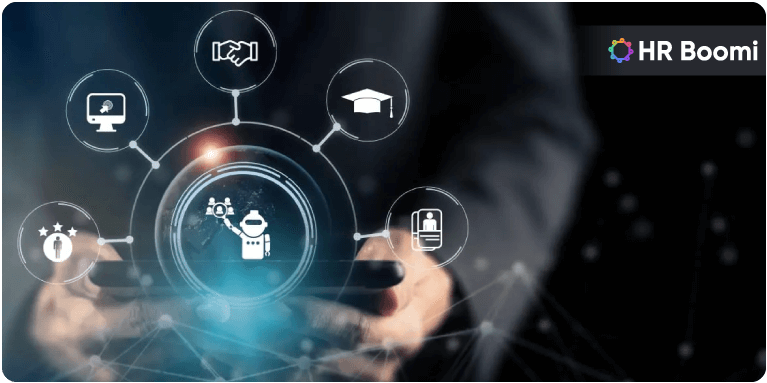
Table of Contents
Within the ever-evolving panorama of the modern-day enterprise, employee management has become pivotal in achieving organisational fulfilment. As the Fourth Business Revolution unfolds, artificial intelligence (AI) has emerged as a transformative force, reshaping how groups train their staff. This essay explores 4 compelling ways in which AI is revolutionising employee management, dropping light on the effect of these improvements and their capabilities.
In step with the latest survey by the World Economic Forum, “by 2025, over 1/2 of all the contemporary places of job tasks can be accomplished by machines, as opposed to 29% nowadays.” With such an awesome forecast in idea, it’s miles critical to recognize the function AI is gambling in this variation. Let’s delve into the info to recognize the importance of AI in employee management.
Recruitment and Talent Acquisition
Recruiting the right talent is a necessary project for organizations. The manner is time-consuming, resource-extensive, and susceptible to human biases. AI has brought considerable upgrades to this region.
Resume Screening
AI-driven algorithms have revolutionized the resume screening technique. They could hastily examine thousands of resumes within seconds, matching candidate qualifications with process necessities. This automation no longer solely hastens the hiring system but guarantees that every potential candidate is treated equally, as AI evaluates candidates based on predefined standards. It allows businesses to streamline recruitment while lowering the chance of human bias, ensuring a more diverse and inclusive staff.
Candidate Sourcing
AI performs a pivotal function in candidate sourcing with the aid of identifying ability candidates from numerous resources, inclusive of social media and expert networks. This functionality expands the intelligence pool, presenting organizations with a broader and more diverse range of candidates. AI-driven sourcing now not only improves the possibilities of finding top talent but also enables tapping into hidden talent markets, ultimately strengthening the employer’s capability to fulfill its staffing wishes.
Chatbots and Virtual Interviews
AI-driven chatbots have proved to be instrumental in the recruitment technique. They can answer candidate questions, provide data about job openings, and even agenda interviews. Virtual interviews, every other AI-powered innovation, correctly check applicants, saving time and sources for both employer and employees. These technologies enhances employee enjoyment via presenting comfort, accessibility, and consistency while additionally permitting recruiters to recognize more strategic aspects of the hiring method. This represents a win-win situation for all events involved in recruitment.
According to a survey via LinkedIn, 76% of talent professionals trust that AI’s impact on recruiting will be widespread. With AI-driven recruitment, corporations can streamline the hiring procedure, reduce human bias, and make more informed selections.
Performance Management and Feedback
Traditional overall performance control regularly includes annual or biannual reviews, which can be inefficient and demotivating for personnel. AI is changing the sport by means of offering continuous comments and customized development plans.
Real-time Performance Analytics
AI gear excels in supplying actual-time performance analytics for personnel. They continuously screen key performance metrics and can immediately give remarks primarily based on the statistics collected. These instantaneous comments empower personnel to make well-timed enhancements accurate courses, and align their actions with organizational goals. It now complements individual overall performance and contributes to standard productiveness and performance in the enterprise.
Personalized Development
AI’s power lies in its capacity to investigate a worker’s strengths and weaknesses, thereby enabling the advice of personalized training and development programs. By providing training to each employee’s correct desires, AI increases overall performance in person and group. Those targeted development tasks enhance competencies, task pride, and successful profession, aligning the workforce more closely with the enterprise’s strategic dreams.
360-Degree Feedback Analysis
AI plays a crucial role in processing comments from various resources to provide a comprehensive view of a worker’s overall performance. This multi-faceted feedback evaluation consists of input from friends, supervisors, and subordinates, providing a well-rounded angle. Managers benefit from this holistic view, allowing them to make extra-informed decisions about promotions, increments, and professional development possibilities. The result is a more transparent and truthful overall performance assessment manner that fosters a lifestyle of non-stop improvement.
A Gallup survey reveals that only 14% of employees strongly agree that their performance opinions encourage them to enhance AI’s capability to offer continuous and personalized comments can remodel how personnel understand their overall performance and growth.
Employee Well-being and Engagement
Employee well-being is a developing subject for corporations. Engaged and cozy employees are more productive and stay with their employers longer. AI plays a necessary role in improving worker well-being and engagement.
Mental Health Support
AI-driven chatbots and digital assistants have emerged as precious assets for personnel looking for mental fitness assistance. These AI-powered structures offer a discreet and non-judgmental surrounding for individuals to discuss their emotional well-being.
Immediately giving the access to relevant assets and guidance, they help decrease the stigma associated with intellectual health troubles. Moreover, those AI answers can screen an employee’s mental health over the years, alerting HR or control while intervention may be vital, ultimately promoting a more fit workplace.
Personalized Work Schedules
AI’s capability to investigate a worker’s work behavior has revolutionized how work schedules are crafted. AI can create customized schedules by thinking about elements like an individual’s productivity patterns, private commitments, and preferred running hours.
Those customized schedules no longer improve work-life stability; they also lessen burnout and enhance work satisfaction. As a result, employees can better manage their professional and personal lives, maintaining their well-being and productivity.
Employee Feedback Analysis
AI technology is important in reading employee comments to find insights that might pass unnoticed in any other case. By processing statistics from worker surveys, opinions, and remarks, AI can perceive trends and regions of the situation. This data facilitates companies in dealing with precise issues, enhancing work situations, and enhancing work pleasure.
Additionally, AI-driven feedback evaluation fosters a tradition of open conversation and non-stop improvement within the workplace, promoting a more high-quality and productive environment.
The sector of monetary forum reviews that 85 million jobs can be replaced by means of machines, but 97 million new roles may additionally emerge, specializing in regions like intellectual health help and well-being. AI’s role in enhancing well-being is becoming increasingly crucial inside the evolving place of business.
Predictive Analytics for Retention
Worker turnover may be of a massive value for corporations. AI can assist in expecting while personnel are vulnerable to leaving and assist groups to take proactive measures to retain them.
Turnover Prediction
AI algorithms are an effective device for predicting employee turnover. By reading factors like activity pride, performance metrics, and historical information, AI can investigate which personnel are most likely to leave the company. This predictive capability allows agencies to take proactive measures to maintain valuable brains, lowering the prices and disruptions associated with turnover.
Retention Strategies
As soon as AI identifies vulnerable employee, it may suggest customized retention strategies. Those strategies may include focused training programs for talent gaps, promotions to provide development opportunities, or incentives that align with personal goals. Businesses can extensively enhance their probabilities of preserving top talent by tailoring retention efforts to every worker’s specific desires and aspirations.
Succession Planning
AI performs a necessary role in succession planning by identifying excessive potential employees inside an enterprise. Those people, frequently called rising leaders, are appropriate applicants for management roles. The AI-driven analysis considers factors like performance, abilities, and adaptability to pinpoint those with the greatest capacity. This proactive approach guarantees a steady pipeline of talent for leadership positions, avoiding the risks related to unexpected departures and keeping organizational continuity.
According to a record with the aid of Work Institute, over 3 million personnel in the U.S. voluntarily left their jobs in 2021, costing organizations an anticipated $223 billion. AI can play a pivotal role in lowering this astonishing price by supporting companies with treasured intelligence.
Conclusion
The artificial intelligence is revolutionizing worker management in methods that no longer solely enhance efficiency but also beautify the overall worker experience. From streamlining recruitment to presenting non-stop remarks, assisting human beings, and predicting turnover, AI is an invaluable tool for agencies seeking to thrive in an unexpectedly converting work environment.
As AI continues to confirm, corporations must embrace those advancements and adapt their worker management techniques. Those who do will find themselves more prepared to attract, keep, and retain top talent, ultimately achieving long term fulfillment in this ever-competitive worldwide marketplace.
In this era of AI-driven innovation, employee management is undergoing a profound transformation, and the companies that harness the power of AI might be at the forefront of this revolution.
Recent Posts
-

In-house vs. Outsourced Payroll: Pros and Cons
-

Mastering Talent Retention: A Corporate Challenge
-

What is employer branding and how to apply it in your company?
-

The Significance of Employee Communication Within
-

What is time management and why is it important?
-

Net salary: what is it and how is it calculated?
-

Enhancing Employee Experience: Strategies for Excellence
-

10 Best Gifts to Boost Sales Channels
